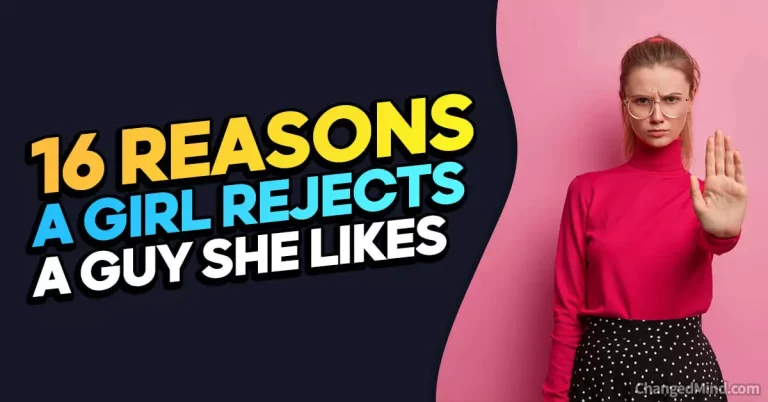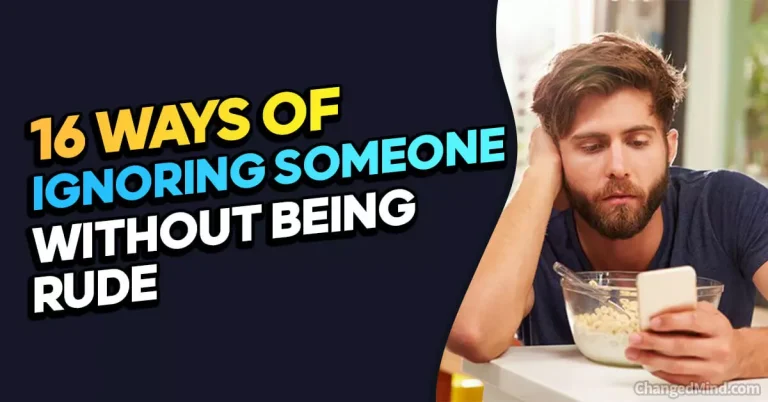Ignoring her when she ignores you – is it a masterful strategy or a recipe for disaster? We’ve all been in those puzzling situations where her radio silence leaves us scratching our heads, contemplating whether to return the favor or launch a full-scale investigation.
Fear not, dear reader, for we’ve got your back! In this rollercoaster of an article, we’ll unveil the truth behind the age-old question: “Should I Ignore Her If She Ignores Me?”
Brace yourself for 16 eye-opening reasons she might be giving you the silent treatment, and hang on tight as we navigate the choppy waters of dating dilemmas and communication conundrums. Ready for the inside scoop? Let’s dive in!
✨ The Short Answer: As tempting as it may be to disappear into the Bermuda Triangle of silence, the answer isn’t a simple yes or no. It’s time to ditch the magic eight ball and gain some clarity on why she’s playing hide-and-seek. But don’t worry; we’ll equip you with the insights you need to make the best decision for your situation.
📝 Key Points to Expect:
- Understanding the psychology behind silence.
- The potential reasons for her vanishing act.
- How your response can impact the situation.
- Communication tips to break the ice.
- Signs it’s time to move on, gracefully.
Get ready for an enlightening ride, where the mysteries of the dating world will be unraveled, one enigmatic silence at a time. So buckle up, grab some popcorn, and let’s embark on this captivating journey together! 💫
Understanding Being Ignored
Being ignored by someone, especially someone we care about or have a connection with, can be a confusing and hurtful experience. It can leave us questioning our worth and wondering what we did wrong. To gain clarity and navigate through this situation, it is important to understand why people ignore others and how we should respond in such situations.

Why Do People Ignore Others?
There can be various reasons why someone chooses to ignore another person. It could be due to their own emotional state, a need for space, a desire to assert power, or as a way to avoid conflict or difficult conversations. It is essential to remember that the reasons behind someone’s decision to ignore may not always be a reflection of our actions or worth.
Should I Ignore Her If She Ignores Me?
When faced with being ignored, it may be tempting to reciprocate by ignoring the individual in return. This approach may not always be the most effective in addressing the situation or preserving the relationship. Reacting with silence can lead to further misunderstandings and hinder the opportunity for resolution. Instead, it is important to consider different perspectives and explore alternative ways to respond.
Alternative Ways to Respond
Rather than ignoring the person who is ignoring us, it can be more productive to focus on effective communication and self-reflection. Engaging in an open and honest conversation can help address any misunderstandings or issues that may be causing the silence. Taking time for self-reflection allows us to gain insights into our own emotions, behaviors, and needs, which can contribute to healthier interactions.
When Ignoring Can Be Beneficial
While ignoring others is generally not recommended as the first approach, there are situations where it can be beneficial. Maintaining boundaries is important, and if someone consistently disrespects or mistreats us, it may be necessary to distance ourselves for our own well-being. Focusing on self-improvement and personal growth can be a positive use of our energy rather than dwelling on being ignored.
Seeking Resolution
If the goal is to resolve the issue and rebuild the connection, initiating an honest conversation is key. Expressing our feelings and concerns without blame or accusation allows for a respectful dialogue. In some cases, acknowledging any mistakes and offering an apology can also help in resolving conflicts and rebuilding trust.
Dealing with Rejection and Moving On
Sometimes, despite our efforts, resolving the situation may not be possible. In such instances, it is important to prioritize acceptance and self-care. Accepting that we cannot control others’ actions or choices allows us to focus on healing and moving forward. Exploring new opportunities and connections can help us grow and find happiness beyond the situation that caused us to be ignored.
By understanding being ignored, considering different ways to respond, seeking resolution when appropriate, and prioritizing self-care, we can navigate through the challenging experience of being ignored and emerge stronger and wiser.
Key takeaway:
- Understanding being ignored: It is important to understand why people ignore others to effectively respond. Different perspectives can help in comprehending the situation better.
- Reacting with silence: Instead of ignoring someone who ignores you, practicing effective communication and considering alternative ways of responding can lead to resolution and understanding.
- Beneficial aspects of ignoring: Maintaining boundaries and focusing on self-improvement can sometimes be beneficial when faced with being ignored. Seeking resolution through honest conversation or acceptance and self-care are recommended approaches as well.
16 Reasons Why She Ignores You

- Overwhelmed with emotions: Sometimes, women retreat to sort through their feelings, leaving you in the dark.
- Testing the waters: Ignoring you could be her way of gauging your interest and commitment.
- Playing hard to get: She might believe that making you work for her attention will strengthen the connection.
- Busy bee: A hectic schedule could leave her with little time for communication.
- Past wounds: Previous experiences may have made her cautious about opening up.
- Conflicting feelings: She might be grappling with mixed emotions, unsure how to proceed.
- Seeking space: Personal issues might lead her to seek solitude for a while.
- Avoiding confrontation: Ignoring you could be her way of sidestepping difficult conversations.
- Lack of chemistry: She might not feel the same spark between you.
- Fear of vulnerability: Opening up can be scary, leading her to keep her distance.
- Communication style: Differences in communication preferences may lead to misunderstandings.
- Feeling pressured: Pushing too hard for a response can drive her away.
- Experiencing doubts: She may be questioning the compatibility of your relationship.
- Looking for independence: Wanting to assert her individuality, she might distance herself.
- Trying to forget: Unresolved issues might make her step back to clear her mind.
- Lost interest: Regrettably, her feelings may have faded over time.
Remember, understanding her reasons can help you navigate the situation with empathy and wisdom. Communication and patience will be your allies in deciphering the puzzle of her silence.
Understanding Being Ignored
Being ignored is a common experience that can cause frustration, confusion, and hurt. Understanding the reasons behind being ignored is crucial for effectively navigating such situations. Here are some vital points to consider when trying to understand being ignored:
1. Lack of interest: Understanding being ignored can mean that the other person is not interested in engaging with you. This could be due to differences in personalities, priorities, or values. It’s essential to acknowledge this possibility instead of dwelling on it.
2. Communication breakdown: To understand being ignored, evaluate the communication patterns and context of the situation. Did you clearly express your thoughts and feelings? Did the other person have a chance to respond? Reflecting on these aspects can help shed light on why you might have been ignored.
3. Busyness and distractions: People have busy lives and countless responsibilities, which can result in unintentional ignorance. Don’t take it personally if someone is ignoring you due to their own busy schedule or preoccupations. Give them the benefit of the doubt and consider reaching out again at a more convenient time.
4. Conflict or disagreement: To understand being ignored, acknowledge that ignoring someone can be a passive way of expressing disagreement or conflict. If you recently had a disagreement or difference of opinion with someone, they may be ignoring you to avoid confrontation. In such cases, addressing the issue directly and calmly can open up communication channels and resolve any conflicts.
5. Personal boundaries: To understand being ignored, recognize that everyone has their own boundaries regarding social interactions. Being ignored could be a result of the other person needing space or setting personal limits. Respect their boundaries and give them the time and space they require. This shows understanding and can help maintain a healthy relationship.
Remember that understanding being ignored doesn’t mean condoning or excusing disrespectful behavior.
Maintain self-respect and set your own boundaries as well. If being ignored becomes frequent or causes significant distress, seek support from friends, family, or professionals who can provide guidance and assistance.
Value your well-being and cultivate relationships based on mutual respect and open communication.
Why Do People Ignore Others?

People ignore others for various reasons. Understanding these reasons can provide insights into why do people ignore others, human behavior, and relationships.
1. Lack of interest: Some may ignore others if they find them unappealing due to differences in personality, values, or physical attractiveness.
2. Feeling overwhelmed: Individuals may ignore others when they feel stressed and need time to recharge or deal with their own issues.
3. Avoiding confrontation: Ignoring someone can be a way to avoid difficult conversations. Some find it easier to ignore others rather than address problems directly.
4. Power dynamics: Ignoring can be a way for individuals to exercise control over others, giving them a sense of dominance.
5. Emotional protection: People may choose to ignore others to protect themselves from potential emotional pain or rejection, using it as a defense mechanism.
6. Prioritizing personal goals: Some may ignore others because they have other priorities or goals they are focused on, such as work or personal projects.
7. Communication breakdown: Misunderstandings or miscommunications can lead to unintentional ignorance. Clarifying any misunderstandings and resolving conflicts is important.
8. Fear of vulnerability: Ignoring others can help individuals maintain emotional distance and avoid being hurt or rejected.
9. Seeking attention: Some may ignore others to gain attention or provoke a reaction, using manipulation as a tactic to control emotions.
10. Personal circumstances: External factors like stress or personal issues can unintentionally cause people to ignore others. It’s important to understand that individuals may not always be aware of their actions or the impact.
Understanding these reasons can help individuals navigate relationships and foster better communication. Addressing issues openly and honestly promotes understanding and resolution.
Before you decide to ignore her, consider this: silence is golden, but sometimes it’s just plain awkward.
Should I Ignore Her If She Ignores Me?

In the intriguing dilemma of “Should I Ignore Her If She Ignores Me?“, we will explore two distinct approaches: Reacting with Silence and Considering Different Perspectives. Buckle up as we delve into the subtleties of these choices, gaining insights into the dynamics of interpersonal relationships.
With real-life examples and thought-provoking scenarios, we’ll uncover the power dynamics at play and determine whether silence or empathy holds the key to resolving this perplexing question.
Reacting with Silence
Reacting with Silence can be challenging when someone ignores you, but it can also be an effective way to handle the situation. Here are some key points to consider:
1. Active Listening: By remaining silent, you actively listen to the other person’s message. This helps you understand their intentions and motivations.
2. Non-confrontational Approach: Silence avoids arguments and heated exchanges, creating a calm atmosphere for open communication in the future.
3. Personal Time: Use silence to reflect on the situation, assess your own feelings, and consider any misunderstandings or reasons behind the person’s behavior.
4. Seeking Clarity: If the person continues to ignore you, address the issue directly in an honest conversation, expressing your concerns and seeking clarification.
5. Setting Boundaries: Reacting with silence helps establish healthy boundaries. If someone consistently ignores or disrespects you, reevaluate the relationship’s worth.
6. Considering Different Perspectives: During silence, try understanding the other person’s viewpoint to foster empathy and a compassionate approach.
7. Self-Care: Prioritize self-care while being silent. Engage in relaxing activities like mindfulness, exercise, or hobbies to maintain a positive mindset.
Considering different perspectives can help us understand why people ignore others and possibly make us feel grateful that we’re not the ones being ignored… this time.
Considering Different Perspectives
To understand when someone ignores you, it’s important to consider different perspectives. One perspective to keep in mind is that the person may be dealing with their own personal issues or stressors. Instead of taking it personally, empathize and recognize that they may be going through a difficult time.
Another perspective to consider is that the person may have a different communication style. Some individuals find constant communication overwhelming and need time to process before responding. It’s crucial to respect their boundaries and give them the space they need.
Miscommunication or misunderstandings can also play a role in someone ignoring you. It’s essential to clarify any confusion and address underlying issues with open and honest conversations. By considering different perspectives, you can foster better communication and potentially resolve conflicts.
To navigate the situation effectively, it’s beneficial to put yourself in the other person’s shoes. Take a moment to reflect on whether your behavior may have unintentionally caused them to ignore you. By self-reflecting and being open to feedback, you can gain a better understanding of their behavior.
Alternative Ways to Respond
Looking for alternative ways to respond when someone ignores you? Look no further! In this section, we’ll explore effective communication techniques and the power of self-reflection.
Discover how to navigate through challenging interactions and find new ways to tackle misunderstandings. Whether you’re seeking resolution or personal growth, these strategies will empower you to handle the situation with grace and insight.
Effective Communication
Effective communication is crucial for resolving conflicts and maintaining relationships. When someone ignores you, applying effective communication strategies can help address the issue. Here are important aspects to consider for effective communication:
- Actively listen to the other person’s perspective to foster understanding and open dialogue.
- Use “I” statements when expressing feelings or concerns to take ownership of your thoughts.
- Demonstrate empathy by understanding the other person’s emotions and motivations.
- Choose the right time and place for discussions, ensuring both parties are calm and receptive.
- Seek mutual understanding by finding common ground and asking open-ended questions.
- Use non-verbal communication such as body language and facial expressions positively.
- Practice patience in resolving conflicts and addressing communication issues.
Remember, effective communication requires both parties to actively participate and engage in respectful dialogue. By actively listening, expressing empathy, and seeking mutual understanding, conflicts can be resolved and relationships can be strengthened.
Now, let me share a true story that showcases the power of effective communication. I once had a colleague who ignored me during team meetings. Instead of confronting her aggressively or shutting down, I scheduled a one-on-one conversation.
Through active listening, I discovered she had personal issues affecting her engagement. By expressing empathy and seeking mutual understanding, we implemented a system for equal participation, resolving the issue and improving teamwork.
Self-reflection
Self-reflection is crucial when someone ignores you. It helps you gain insight into your own thoughts, actions, and emotions. By reflecting on the situation, you can understand the dynamics, evaluate your behavior, and determine the appropriate action.
During moments of being ignored, it is natural to question what caused the shift in the relationship. Self-reflection helps you analyze your actions and identify factors that may have contributed to the other person’s decision to ignore you. This process allows you to take responsibility for your behavior and make necessary changes.
Self-reflection also encourages empathy and understanding. Putting yourself in the other person’s shoes allows you to gain a deeper understanding of their actions and potential reasons for ignoring you. Remember that individuals have their own reasons for their behavior, and reflecting on the situation can help you recognize any misunderstandings or miscommunications.
In addition, self-reflection can help you manage your emotions. When someone ignores you, it is natural to feel hurt, frustrated, or rejected. Through self-reflection, evaluate and process these emotions in a healthy manner. Identify negative thought patterns, challenge them, and find ways to build resilience.
To engage in self-reflection, find a quiet space, take deep breaths, and focus on the situation. Consider the events, your reactions, and any triggers. Reflect on your behavior and think about adjustments for the future.
Suggestions:
1. Take time for self-care and focus on activities that bring you joy and relaxation.
2. Seek support from trusted friends or a therapist during challenging times.
3. Practice open and effective communication when discussing your feelings with the person who ignored you.
4. Invest in personal growth and development to enhance your self-confidence and self-worth.
5. Explore new opportunities and engage in activities that align with your interests and passions.
When Ignoring Can Be Beneficial
When it comes to dealing with someone who ignores us, there are times when ignoring can actually work to our advantage. In this section, we’ll explore the benefits of understanding when and how to maintain boundaries, as well as the power of focusing on self-improvement.
By appreciating these aspects, we can navigate the complexities of interpersonal relationships with confidence and wisdom. So, let’s dive in and uncover the hidden benefits of knowing when to ignore.
Maintaining Boundaries
Maintaining boundaries is crucial when someone ignores you. Establishing and respecting personal limits is important for a healthy relationship dynamic. Consider the following key points:
- Set clear expectations: Communicate your boundaries from the start to prevent misunderstandings and feelings of being ignored.
- Respect personal space: Give others the freedom and space they need, and they will likely do the same for you.
- Prioritize self-care: Take care of your physical and emotional well-being. Set aside time for self-reflection, relaxation, and activities that bring joy.
- Learn to say no: It’s okay to refuse requests that go against your boundaries or make you uncomfortable. Being assertive is crucial for maintaining healthy boundaries.
- Establish consequences: Set limits on time spent with someone who consistently crosses your boundaries or ignores your needs. Reevaluate the relationship if necessary.
- Seek support if needed: If maintaining boundaries is difficult, seek guidance from friends, family, or a therapist.
Maintaining boundaries fosters healthy relationships and ensures personal well-being. It provides control over one’s life and promotes respect in relationships.
Fact: Studies show that maintaining healthy boundaries leads to greater happiness and life satisfaction. It allows individuals to have more control over their lives and promotes mutual respect in relationships.
Improving yourself is like opening a door, except instead of finding opportunity, you find a better version of yourself waiting on the other side.
Focusing on Self-improvement
When faced with being ignored, it is important to shift your focus towards self-improvement rather than getting caught up in analyzing the behavior of the person ignoring you.
By dedicating time and effort to bettering yourself, you not only experience personal growth, but also enhance your well-being and increase the likelihood of positive interactions.
There are several ways you can concentrate on self-improvement when you find yourself being ignored:
1. Cultivate your personal interests: Take the opportunity to explore new hobbies or further develop existing ones. Engaging in activities that bring you joy will boost your self-confidence and help you maintain a positive outlook.
2. Enhance your communication skills: Work on improving your active listening abilities, empathy, and effective expression. These skills will not only benefit your interactions with the person who is ignoring you, but also with others in your life.
3. Set personal goals: Reflect on your aspirations and establish specific, measurable goals that align with your values. This will give you a sense of purpose and direction in your life.
4. Build your self-confidence: Participate in activities that enhance your self-esteem and self-worth. Take care of your physical and mental well-being, practice positive self-talk, and surround yourself with supportive individuals.
5. Seek opportunities for personal growth: Embrace challenges and actively seek out workshops, courses, or books on personal development. Continuous learning and self-improvement will make you a more well-rounded and confident individual.
It is important to remember that focusing on self-improvement should not be driven by the desire to regain attention. Instead, view it as an opportunity to invest in yourself, improve your well-being, and become the best version of yourself.
Pro-tip: Self-improvement is an ongoing process. If you encounter setbacks, be gentle with yourself. Embrace the journey, learn from your experiences, and celebrate your progress. By prioritizing self-improvement, you regain control of your happiness and personal growth.
Seeking Resolution
When it comes to seeking resolution in relationships, it’s important to approach the situation with empathy and open communication. In this section, we’ll dive into two key aspects: initiating honest conversations and understanding the power of apologizing if needed.
By delving into these sub-topics, we will uncover effective strategies to mend strained connections and foster healthier relationships. So, let’s explore these insights and learn how to navigate the complexities of seeking resolution in our interactions.
Initiating Honest Conversation
When someone ignores you, having an honest conversation can help address the issue and find a resolution. Here are some steps to consider:
1. Choose the right time and place: Find a quiet setting where you can talk without distractions. Approach the conversation when both parties are calm and open to communication.
2. Express your feelings: Start by explaining how you feel about being ignored. Use “I” statements to avoid sounding accusatory. For example, say, “I feel hurt and confused when you ignore me.”
3. Ask for clarification: Give the other person a chance to explain their behavior. Ask open-ended questions to encourage them to share their perspective. For example, ask, “Can you help me understand why you’ve been ignoring me?”
4. Listen actively: Pay attention to what the other person is saying and avoid interrupting or making assumptions. Show empathy and try to understand their point of view. This will create a safe space for communication.
5. Share your perspective: Once the other person has clarified their reasons, calmly express your thoughts and concerns. Use “I” statements to avoid sounding judgmental. For example, say, “I value our friendship, and I would like to address any issues or misunderstandings we may have.”
6. Seek a resolution: Discuss ways to improve communication and find a resolution together. Brainstorming solutions can strengthen your relationship and prevent future misunderstandings. Focus on compromise and finding common ground.
Initiating an honest conversation is crucial for resolving conflicts and building healthier relationships. Expressing feelings, clarifying misunderstandings, and working towards a resolution are all key. Remember, effective communication is essential for resolving any issue.
Fact: Research shows that open and honest communication is crucial for resolving conflicts and enhancing relationship satisfaction.
Apologizing If Needed
Ignoring someone can be frustrating and hurtful. It is important to handle the situation with maturity and empathy. Apologizing, if necessary, can help resolve conflicts and maintain healthy relationships.
Apologizing shows responsibility for mistakes or misunderstandings. It acknowledges the impact of your actions and demonstrates commitment to finding a resolution. Here are important considerations when apologizing, if needed:
1. Reflect on your actions: Consider if you may have done something to make the other person feel ignored. Honest self-reflection is key to understanding your role.
2. Recognize the impact: Apologize for any unintended hurt or misunderstanding. Validate the other person’s feelings.
3. Be sincere and specific: Provide a genuine apology by clearly communicating what you are sorry for. Avoid vague statements and be specific about the actions or words you regret.
4. Take responsibility: Accept accountability for your actions. Avoid making excuses or blaming others.
5. Offer a solution: Along with your apology, suggest ways to improve the situation or prevent similar misunderstandings in the future.
Remember, apologizing is about resolving the issue, not proving yourself right or wrong. It requires humility and empathy and can have a positive impact on the relationship.
A few years ago, I unintentionally ignored a close friend during a stressful period in my life. I was overwhelmed with work and personal issues, neglecting our friendship. When my friend approached me about feeling ignored, I realized my mistake.
I immediately apologized and took full responsibility for my behavior. I acknowledged the hurt I caused and assured my friend that their feelings were valid. I reassured them that I valued our friendship and wanted to make amends.
To make it right, I prioritized our friendship. I actively listened, made time for regular catch-ups, and supported my friend during their difficult times. Our friendship grew stronger as a result of my sincere apology and actions.
Apologizing when needed can resolve conflicts and maintain meaningful relationships. It demonstrates emotional intelligence, empathy, and a genuine commitment to personal growth.
Dealing with Rejection and Moving On

Dealing with rejection can be tough, but it’s all about finding ways to move on and thrive. In this section, we’ll dive into powerful strategies to navigate the aftermath of being ignored.
From embracing acceptance and focusing on self-care, to seizing new opportunities, we’ll explore actionable steps to bounce back stronger. So, if you’ve ever wondered how to handle being ignored, get ready to discover empowering methods to grow and flourish.
Acceptance and Self-care
Acceptance and self-care are crucial elements to consider when dealing with being ignored. In order to cultivate acceptance and practice self-care in such circumstances, consider the following strategies:
1. Recognize your emotions: Take the time to acknowledge and validate your feelings of hurt, confusion, or disappointment when someone ignores you. Avoid dwelling on negative emotions excessively.
2. Practice self-reflection: Reflect on the situation and try to understand any factors that may be contributing to the other person’s behavior. It’s important to avoid blaming yourself excessively or assuming responsibility for their actions.
3. Focus on your well-being: Engage in activities that bring you joy and promote self-care, such as pursuing hobbies, spending time with loved ones, exercising, or practicing mindfulness techniques like meditation or journaling.
4. Set healthy boundaries: If someone continues to ignore you despite your efforts to address the situation, it may be necessary to establish boundaries. This can involve limiting contact with the person and seeking support from friends and family.
5. Seek connection elsewhere: Redirect your attention and energy towards fostering relationships with people who appreciate and value your presence. Engage with friends, colleagues, or individuals who reciprocate your efforts and show genuine care.
6. Practice acceptance: Accept that you cannot control others’ behavior or how they respond to you. Focus on accepting the situation and finding inner peace. Let go of expectations and move forward with a positive mindset.
7. Practice self-compassion: Be kind and gentle with yourself. Remember that being ignored does not define your worth. Treat yourself with compassion and understanding, just as you would support a friend going through a similar experience.
8. Explore new opportunities: Use this experience as a chance for personal growth. Invest your time and energy into activities, projects, or goals that align with your interests and aspirations. Embrace new opportunities to build self-confidence and shift your focus away from being ignored.
Remember, acceptance and self-care are essential during times of being ignored. Prioritize your well-being and embrace acceptance to support emotional resilience and foster positive personal growth.
Exploring New Opportunities
When ignored, view it as a chance to create positive changes in your life. Instead of dwelling on rejection, focus on self-growth and new opportunities. Here are ways to explore new opportunities when ignored:
- Expand your social circle: Meet new people and make connections. Join clubs, attend events, or engage in activities aligned with your interests. By putting yourself out there, you increase the chances of encountering individuals who appreciate and value you.
- Pursue personal interests and hobbies: Invest in activities that bring joy and fulfillment. Explore new hobbies or delve deeper into existing ones. This helps you discover new passions, boost self-confidence, and find purpose.
- Invest in self-improvement: Focus on personal development to enhance skills, talents, and knowledge. Enroll in courses, workshops, or seminars aligned with your goals. Constant learning and growth make you more attractive and interesting, opening doors for new opportunities.
- Challenge yourself: Step out of your comfort zone and take on new challenges. Push yourself to try new experiences, confront fears, and take calculated risks. Embracing challenges broadens horizons and creates opportunities for personal and professional growth.
- Travel and explore new places: Broaden your perspective, experience new cultures, and meet people from different walks of life through travel. Exploring new places ignites a sense of adventure.
- Reevaluate goals and dreams: Use being ignored as a catalyst for self-reflection. Reassess goals and aspirations. Determine what you truly want in life and set new targets. Redefine your path and pursue dreams with renewed determination.
Remember, being ignored by one person does not define your worth or limit your potential. Exploring new opportunities creates space for personal growth, happiness, and success. Embrace this period as a chance to evolve and discover the best version of yourself.
Some Facts About “Should I Ignore Her If She Ignores Me?”:
- ✅ A woman ignoring you does not mean you should ignore her. (Source: Our Team)
- ✅ Understanding the reasons behind her behavior is important. (Source: Our Team)
- ✅ Ignoring a woman who just friendzoned you may be beneficial. (Source: Road to Solidity)
- ✅ Ignoring a woman you’re in a relationship with who lost interest requires different approaches to turn things around. (Source: Road to Solidity)
- ✅ Ignoring a woman interested in you but playing hard to get is not mandatory but can be done if desired. (Source: Road to Solidity)
Frequently Asked Questions
Should I stop talking to a girl if she ignores me?
It depends on the situation. If she ignores you because she’s not interested and hopes you’ll stop pursuing her, it’s best to respect her decision and give her space. If there might be other reasons for her behavior, such as her playing hard to get or being shy, it may be worth trying to understand the underlying cause and adjusting your approach accordingly.
How can I win the attention of a girl who is playing hard to get?
While ignoring her is not mandatory, it can be done if desired. Instead of completely ignoring her, you can try making a big gesture to catch her eye or give her some space to see if she starts showing more interest. It’s important to stay detached and not show too much enthusiasm when she starts showing interest again, as this can help maintain balance in the dynamic.
Is it a good idea to give another girl attention to make the girl who ignores me jealous?
Trying to make a girl who ignores you jealous by giving attention to another girl is not always the best approach. It can create unnecessary drama and may backfire. Instead, focus on improving yourself and showing the girl you’re interested in that you have your own life and can move on if need be.
How can I get a straight answer from a girl who ignores me?
If you’re confused about why a girl is ignoring you, you can try asking her directly and expressing your feelings or concerns. Alternatively, you can ask her friends for insight, but remember to approach the situation delicately and respectfully.
What can I do to attract a shy girl who ignores me?
To attract a shy girl who ignores you, it’s important to make her feel comfortable and safe in your presence. Be patient and understanding, try pursuing her gently and making things interesting. Showing sincere interest and proving your affection through small gestures, like a thoughtful love note, can go a long way in winning her attention.
Does being well-groomed and physically attractive help in getting a girl’s attention?
While physical appearance can play a role in attracting someone’s attention, it is not the sole determining factor. Being well-groomed and taking care of your appearance can make you more confident and approachable, which can make you more attractive to a girl. It’s important to remember that a meaningful connection goes beyond looks, and focusing solely on physical attractiveness may not result in a lasting connection.







